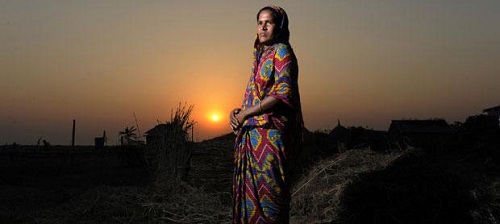
This article is a reprint of news release posted by Oxfam International on Sep 23, 2013
Climate change will leave families caught in a vicious spiral of falling incomes, rising food prices, and declining quality of food, leading to a devastating impact on the health of millions, Oxfam warns today (Sep 23, 2013).

Oxfam’s new report Growing Disruption offers an up to date assessment of the links between climate change and the many causes of hunger. While there is increasing awareness that climate change can harm crop production, the report shows that its threat on food security is much broader, hitting incomes, food quality and human health in ways that are not yet well understood.
At a time when one in eight people are going hungry and demand for food is rising, climate change will not only reduce production, it will reduce the nutritional value of both crops and livestock, worsen human health and lead to higher prices. Climate change will mean that many more people will not be able to afford enough to eat and this toxic mix is likely to hit regions that are already more susceptible to food insecurity.
The report comes ahead of the launch of the Intergovernmental Panel on Climate Change (IPCC) assessment report (AR5) on Friday. Final discussions between governments and scientists begin today in Stockholm.
The IPCC is expected to confirm beyond doubt that climate change is not only happening, but that it is getting worse and that humans have caused the majority of it.
Tim Gore, Head of Policy for Oxfam’s GROW campaign said: “Just as the evidence of man-made climate change is becoming stronger, so too is our understanding of how it hits people, especially around hunger.
“We've long known that climate change will mean lost crops, but increasingly we're seeing its impacts through higher food prices, lower earnings, more health problems and lower quality food too."
Oxfam has previously estimated that the average price of staple foods is likely to more than double in the next 20 years compared with 2010 trend prices – with up to half of the increase caused by climate change.
The events highlighted in the report offer a glimpse of potential future impacts which will get worse and more frequent in urban as well as rural areas:
Gore said: “We want a world in which everyone enjoys the right to enough affordable and nutritious food, and we cannot allow climate change to throw us off course.
“Leaders listening to the latest findings from climate scientists this week must remember that a hot world is a hungry world. They must take urgent action to slash emissions and direct more resources to building a sustainable food system.”
The first of four separate instalments of The Intergovernmental Panel on Climate Change (IPCC) fifth assessment report (AR5) will be launched on Friday 27th September. It will be its first assessment report since 2007 (AR4), the year the IPCC won the Nobel Peace prize. The first instalment will focus on the physical science basis of the climate system.
There are four recognized pillars of world food security which Oxfam’s report considers: availability, access, utilization and stability.
Download the report: Growing Disruption: Climate Change, Food, and the Fight Against Hunger
A further Oxfam report as referred to above - After the Drought based on interviews with Russian farmers affected by the droughts of 2010 and 2012 will be published and available for copies from Wednesday 25th.
Statistic from 2011 Oxfam report: Growing a Better Future, Food justice in a resource constrained world - the average price of staple foods is likely to more than double in the next 20 years compared with 2010 trend prices – with up to half of the increase caused by climate change.
Posted by John Hartz on Wednesday, 25 September, 2013
 |
The Skeptical Science website by Skeptical Science is licensed under a Creative Commons Attribution 3.0 Unported License. |